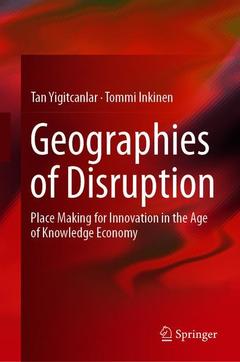Geographies of Disruption, 1st ed. 2019 Place Making for Innovation in the Age of Knowledge Economy
Auteurs : Yigitcanlar Tan, Inkinen Tommi

This book looks at the uncharted territory between innovation activities and place making efforts to cultivate them. ?Geographies of Disruption? aims to fill that gap by exploring the growing importance of place making for knowledge generation and innovation activities in contemporary cities, and providing an in-depth understanding of both theoretical and practical aspects of innovation geographies and the conditions that help their emergence and growth. This book underlines the growing importance of knowledge generation and innovation activities for the competitiveness of cities and their regions. It provides an in-depth and comprehensive understanding of both theoretical and practical aspects of knowledge-based urban development and its implications and prospects for cities and regions. This pioneering book contributes to the conceptualisation and practice of innovation geographies by disseminating both conceptual and empirical research findings with real-world best practice applications. With a multidisciplinary approach to themes of technology and urban development, this book is a key reference source for scholars, practitioners, consultants, city officials, policymakers and innovation study enthusiasts.
Part I: Theory of Innovation Geography.- Chapter 1. Introduction.- Chapter 2. Conceptual Foundations of Innovation Geography.- Chapter 3. Place Dynamics for Innovation.- Chapter 4. Conclusions.- Part II: Practice of Innovation Geography.- Chapter 5. Introduction.- Chapter 6. Characteristics of Innovation Geography.- Chapter 7. Insights from Northern European Best Practices.- Chapter 8. Conclusions.- Part III: Knowledge Cities.- Chapter 9. Introduction.- Chapter 10. Theory and Practice of Knowledge Cities and Knowledge-Based Urban Development.- Chapter 11. Global Knowledge City Best Practice.- Chapter 12. Benchmarking Knowledge City Performance.- Chapter 13. Recommendations and Strategic Directions.- Chapter 14. Conclusions.- Part IV: Knowledge Precincts.- Chapter 15. Introduction.- Chapter 16. Theory and Practice of Knowledge Precincts.- Chapter 17. Global Knowledge Precinct Best Practice.- Chapter 18. Benchmarking Knowledge Precincts.- Chapter 19. Recommendations and Strategic Directions.- Chapter 20. Conclusions.
Tan Yigitcanlar is an Associate Professor at the School of Civil Engineering and Built Environment, Queensland University of Technology, Brisbane, Australia. Along with these positions, he also carries out an Executive Director role at the World Capital Institute, Monterrey, Mexico, and an Adjunct Professor positions at the Federal University of Santa Catarina, Florianopolis, Brazil, and Open Innovation Academy, Daegu, Korea. He has been responsible for research, teaching, training and capacity building programs on the fields of urban and regional planning, development and management in esteemed Australian, Brazilian, Korean, Finnish, Japanese and Turkish universities. The main foci of his research interests are clustered around the following interrelated and interdisciplinary themes: ‘Knowledge-Based Urban Development and Knowledge Cities’, ‘Sustainable Urban Development and Sustainable Cities’, ‘Intelligent Urban Technologies and Smart Cities’. He is an Editor-in-Chief of ‘Elsevier’s Smart Cities Book Series’, the Editor-in-Chief of ‘International Journal of Knowledge-Based Development’, a Section Editor-in-Chief of ‘Sustainability’, a Regional Editor of ‘Journal of Knowledge Management’, and an Associate Editor of ‘International Journal of Environmental Science and Technology’, ‘Global Journal of Environmental Science and Management’, ‘Journal of Open Innovation: Technology, Market, and Complexity’, ‘Asia Pacific Journal of Innovation and Entrepreneurship’, and ‘Journal of Smart Cities’. Additionally, he is an editorial board member of ‘Journal of Urban Technology’, ‘Knowledge Management Research & Practice’, ‘Measuring Business Excellence’, ‘International Journal of Knowledge-Based Organizations’, and ‘Urban Science’. He undertakes the Chairman role of the annual ‘Knowledge Cities World Summit’ series, and organised conferences in many locations of the world since 2007. These locations include Monterrey (Mexico), Shenzhen (China), Melbourne (Australia
Brings together place making and geographies of innovation concepts together
Places a large number of global knowledge and innovation cluster best practices to reveal their success secrets
Provides comprehensive conceptual, practical and empirical insights on the innovation geographies
Date de parution : 01-2019
Ouvrage de 326 p.
15.5x23.5 cm
Disponible chez l'éditeur (délai d'approvisionnement : 15 jours).
Prix indicatif 116,04 €
Ajouter au panier


